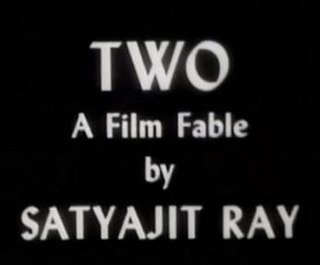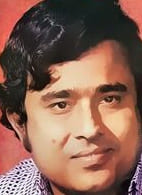
Upendrakishore Ray Chowdhury was a Bengali writer, painter and entrepreneur. One of his written books is Chotoder Shera Bigyan Rochona Shongkolon. He was the son-in-law of reformer Dwarkanath Ganguly. He was also an entrepreneur. He was the first person who introduced color printing in Bengal. He started the first colour children's magazine Sandesh in 1913.

Goopy Gyne Bagha Byne is a 1969 Indian fantasy adventure comedy film written and directed by Satyajit Ray and based on a story by his grandfather Upendrakishore Ray Chowdhury. It is a fantasy-musical film, with the music and lyrics by Ray himself. This is the first film of the Goopy - Bagha series, and there are two sequels - Hirak Rajar Deshe, which was released in 1980, and Goopy Bagha Phire Elo, written by Satyajit Ray but directed by his son Sandip Ray, which was released in 1992.

Hirak Rajar Deshe is an Indian Bengali dystopian fantasy musical film and a sequel to the 1969 anti-war fantasy musical Goopy Gyne Bagha Byne directed by Satyajit Ray. In the film, the musicians Goopy and Bagha travel to the kingdom of the Diamond King, to find a sinister plot at work - subjects are being brainwashed by rewriting their thoughts with rhyming slogans.
Robi Ghosh was an Indian actor known for his work in Bengali cinema. He is known for his comic appeal, though his versatile acting talent brought him success in various kinds of roles. He is probably one of the earliest character actors of Bengali cinema who focused mainly on method acting. Megastar in Bengali film Industry. He participated in the Berlin Film Festival as the lead actor of Goopi Gyne Bagha Byne in the role of Bagha Byne, which was one of his most memorable roles. Thereafter, he was a regular member of Satyajit Ray films over the years. Till date, he is remembered for his comic roles in different movies. Robi Ghosh was a renowned actor in Bengali theatre and TV as well. He also played a character, Badridas, in the episode Amrit ki Maut in Byomkesh Bakshi, broadcast by Doordarshan.
Bansi Chandragupta (1924–1981) was an Indian art director and production designer, regarded among the greatest of art directors of Indian film industry. He won Filmfare Best Art Direction Award thrice, for Seema in 1972, for Do Jhoot in 1976 and for Chakra in 1982. He was awarded Evening Standard British Film Award posthumously for "best technical/artistic achievement" in 1983. He was born in 1924 in Sialkot, Punjab, British India and died on 27 June 1981 in Brookhaven, New York, United States.

Santosh Dutta was a Bengali actor, best known for playing the character of Jatayu in Satyajit Ray's Feluda movie series Sonar Kella and Joi Baba Felunath.

Two: A Film Fable is a 1964 Indian black-and-white short film directed by Satyajit Ray. The film was made under the banner of Esso World Theater at the request of a non-profit American public broadcasting television, PBS. It was made as part of a trilogy of short films from India. The other two films in the trilogy featured Indian Sitar player, Pandit Ravi Shankar and a Ballet troupe from Mumbai, then known as "Bombay". Ray, who worked prominently for Bengali cinema, was requested to make a film in English language with a Bengali setting, however Ray being an admirer of silent film decided to make a film without any dialogue as a tribute to the genre.
Dulal Dutta was a film editor in the Bengali film industry located in Kolkata, West Bengal, India. He is especially remembered for his association with the acclaimed film director Satyajit Ray, whose films were all edited by Datta.
Tapen Chatterjee was a Bengali actor from India who played several roles in Satyajit Ray's films, notably as Goopy Gyne in Goopy Gyne Bagha Byne (1968), and its sequels Heerak Rajar Deshe (1980) and Goopy Bagha Phire Elo (1992). Chatterjee died on 24 May 2010 at the age of 72. He was suffering from pulmonary ailments.

Satyajit Ray was an Indian director, screenwriter, documentary filmmaker, author, essayist, lyricist, magazine editor, illustrator, calligrapher, and composer. Ray is widely considered one of the greatest and most influential film directors in the history of cinema. He is celebrated for works including The Apu Trilogy (1955–1959), The Music Room (1958), The Big City (1963) and Charulata (1964) and the Goopy–Bagha trilogy.

Anup Ghoshal was an Indian playback singer and composer in Hindi and other vernacular Indian films, especially Bengali-language. He was known in his native Bengal primarily as one of the foremost artists of the golden age of Nazrulgeeti.

Goopy Bagha Phirey Elo is a 1992 Indian Bengali comedy film directed by Sandip Ray and written by Satyajit Ray. A sequel to the 1980 film Hirak Rajar Deshe and the third installment of Goopy Gyne Bagha Byne series, the film was released twelve years after its predecessor. It was the third and last installment of the Goopy - Bagha series.
Chinmoy Roy (1940–2019) was an Indian Bengali actor. He was famous for his comic roles in Bengali movies, though his versatility allowed him to play a variety of roles.

Tinu Anand is an Indian actor, director, writer and producer in Hindi cinema and a few Telugu and Tamil films.
Soumendu Roy was an Indian cinematographer most known for his work with noted director Satyajit Ray's films, starting with Teen Kanya (1961), when Subrata Mitra developed an eye-problem, though he has earlier shot Ray's documentary Rabindranath Tagore (1961) and has been an assistant to Subrata in post Pather Panchali films.

Priya Cinema is a uniplex cinema hall situated in Rashbehari Avenue, near Deshapriya Park, Kolkata, West Bengal, India. The management is run by Priya Entertainments Pvt. Ltd. under the leadership of the managing director Arijit Dutta. This is one of the first cinema halls in eastern India to have features like a Dolby Atmos [(sound system)], Xenon Christie projector, Recliner seats, QUBE digital projection system, Harkness Screen and 2K Projection System.

Nemai Ghosh was a noted Indian photographer most known for working with Satyajit Ray, as a still photographer for over two decades, starting with Goopy Gyne Bagha Byne (1969) till Ray's last film Agantuk (1991).
Goopy–Bagha is a series of Indian Bengali fantasy adventure comedy films. The series is based on a story by Satyajit Ray's grandfather Upendrakishore Ray Chowdhury. The first two films Goopy Gyne Bagha Byne (1969) and its sequel Hirak Rajar Deshe (1980) were directed by Satyajit Ray, and the third, Gupi Bagha Phire Elo (1992), was directed by his son Sandip Ray. The trilogy starred Tapen Chatterjee and Rabi Ghosh as Goopy and Bagha, respectively. The 2013 Hindi-language animated film Goopi Gawaiya Bagha Bajaiya was based on the story Goopy Gyne Bagha Byne. The film is directed by Shilpa Ranade.
Shilpa Ranade is an Indian designer, animator, illustrator, filmmaker and academician. She has been faculty at the Industrial Design Centre at IIT Bombay since 2001. She has directed animated short films for Channel 4, UK and her films have been screened all over the world, winning accolades in some of the most prestigious film festivals. The award-winning animation movie Goopi Gawaiya Bagha Bajaiya was her last full-length feature film which world premiered at the Toronto International Film Festival. Her other films are Naja Goes to School and Mani's Dying.
Kamu Mukherjee was a Bengali actor, best known for his role as Mandar Bose in Sonar Kella and Harun in Sandip Ray's first film Phatik Chand.











